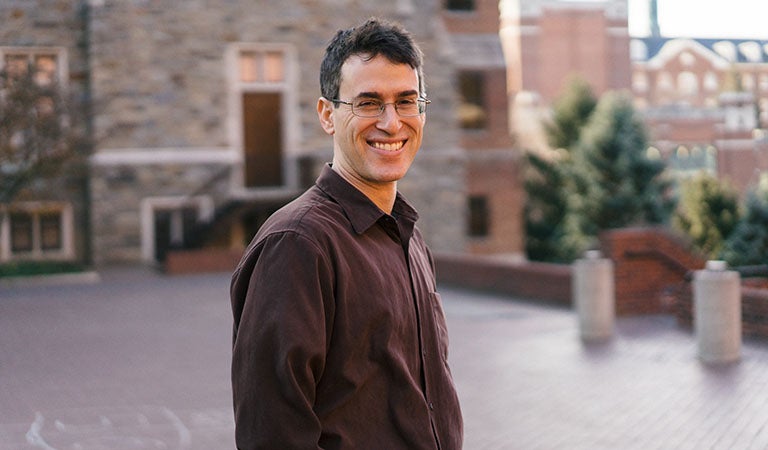Lifshey Receives Distinguished Research Award

Professor Adam Lifshey received the 2017 Provost’s Distinguished Research Award this fall for his work on Spanish-language literature in Africa and Asia and his participation in the New Directions fellowship. (Photo: Kuna Malik Hamad/Georgetown College)
December 19, 2017 — Professor Adam Lifshey has traveled around the world to research Spanish-language literature far beyond what’s traditionally considered the Spanish-speaking world. His efforts have now been recognized with a major faculty award.
Lifshey, a professor in the College’s Department of Spanish and Portuguese, was named a recipient of the 2017 Provost’s Distinguished Research Award after winning a prestigious fellowship and receiving an international award for his book The Magellan Fallacy: Globalization and the Emergence of Asian and African Literature in Spanish.
HIDDEN SPANISH LITERATURE
Lifshey’s research focuses on Spanish-language literature written by West African and Southeast Asian authors, a doubled specialization narrow enough that no academic had undertaken it until Lifshey began his research.
At Georgetown, Lifshey primarily teaches 20th- and 21st-century Latin American cultural traditions. But he had harbored an interest in Spanish literature from Africa since his graduate student days, when he happened to come across a short article on its existence.
“I was immediately interested in a number of things about this literature,” Lifshey said. “First, it was written, even though it came from cultures with strong oral traditions. Second, it was written in Spanish, a language that is generally not associated with Africa. Third, although the authors were African, their books were published and circulated in Spain, and often written from there as well. All of these seeming paradoxes were compelling to me. And once I realized that almost no analytical work had been done on this literature, I began to read all there was to read about it and started writing and publishing my own studies.”
In 2007, Lifshey began broadening his horizons to the Philippines, discovering a trove of Spanish-language literature that had been published there under American colonial rule. Scholars had remained essentially oblivious of this large body of work as well.
“I was fascinated by this idea that you had decades of literature in all genres, all in Spanish, all from Asia, being produced from within the American empire,” Lifshey said.
REWRITING THE STORY
Lifshey eventually compiled enough research and writing to link his two areas of specialty, publishing The Magellan Fallacy in 2012.
“If you ask anyone what they know about Magellan, they may remember from third grade that he sailed around the world. Yet he didn’t — he actually died in the Philippines,” Lifshey said. “The Magellan Fallacy is the idea that those with global reach think they can control the story of their power, when in reality local people are constantly rewriting that story from their own perspectives.”
The book examines the complex nature of local authors in Asia and Africa — primarily the Philippines and Equatorial Guinea — who tried to write the stories of their native lands differently than the narratives promoted by Westerners, and yet did so via forms, media and spaces associated with the West.
“It’s not a binary relationship,” Lifshey said. “They’re writing in the imperial tongue, they’re frequently writing from Madrid or Barcelona. They’re writing for primarily Spanish audiences. So they’re enmeshed, to a degree, within the matrices of the colonizers, and yet they seek to establish their own matrices on their own terms as well. These tensions are extremely compelling to me.”
The Magellan Fallacy received the 2015 A-Asia/ICAS Book Prize, awarded to the best book in the world published between 2009 and 2015 on any topic linking Africa and Asia.
Contestants could enter from any academic discipline; the only restrictions were the publication time frame and the language of publication (English, French, or Portuguese).
While visiting the northern Philippines, Lifshey was struck by the geographic proximity of Taiwan. A search for comparative cultural studies of the two nations turned nothing up, and before long Lifshey had found yet another previously unexplored specialty.
NEW PERSPECTIVES
Lifshey sees a number of unexamined parallels between the two countries that provide a context for comparative cultural investigation.
“You had the long Spanish rule in the Philippines fall to the United States in 1898. But only three years earlier, the long-lasting Qing empire in China had fallen to Japan,” Lifshey said. “And so all of a sudden, Taiwanese were being forced to learn Japanese at the same time when Filipinos were being forced to learn English. And after World War II, you had the dictatorship of Chiang Kai-Shek in Taiwan and the dictatorship of Marcos in the Philippines, both of them carrying on with American support. Eventually, those two dictatorships would fall within a year of each other, and both countries began uneven paths of democratization and globalization.”
Despite such historical parallels, academic specialists who focus on either one of these countries have not thought to compare their neighboring cultures.
“Because of this,” Lifshey said, “Even someone with superficial knowledge like me may have new perspectives to contribute.”
With his research, Lifshey became the first Georgetown professor to be accepted to the New Directions Fellowship, a Mellon Foundation-funded project to enable academics in the early-mid stages of their career to study something they’d never studied before. As a fellowship recipient, he traveled to National Taiwan University to study Mandarin for one summer, then spent a full academic year at SOAS University of London undertaking a Master’s degree in Taiwanese Studies.
The combination of the New Directions Fellowship and the book award earned Lifshey the Provost’s Distinguished Research Award. He hopes the recognition helps promote interest in marginalized Asian and African literary traditions and also collaborative work among academics who focus on different regions.
“I’m hoping this research can help show the value of cross-regional studies,” Lifshey said. “Our students move in a globalized world, and the ways we study and teach should reflect that.”
— Patrick Curran